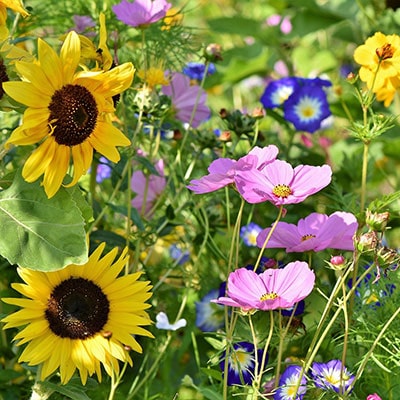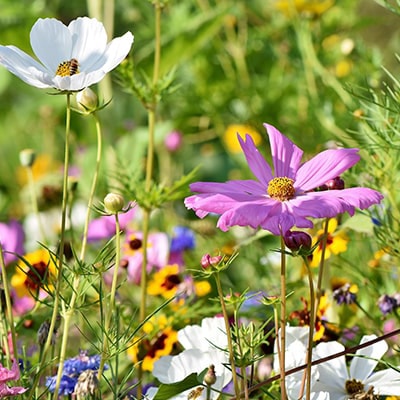
Wild flowers are crucial in helping wildlife across the UK survive, so we caught up with the guys over at Grow Wild to find out about the impact of their work.
Grow Wild is the UK’s biggest wild flower campaign and brings communities together to transform local spaces with native, pollinator-friendly wild flowers and plants. Check out our interview with them below.
Our Interview with Grow Wild
1. Grow Wild is all about repopulating the UK’s wildflower population, having lost 97% of wild flower meadows since 1930. How much of an impact has this loss had on the UK’s wildlife?
This has had a negative impact on local wildlife due to loss of habitats. Pollinators, in particular, are affected due to dwindling numbers of plant varieties.
2. Wild flowers help wildlife, such as butterflies, bees, pollinating bugs and birds, but is there more that we can do to help these creatures in our own gardens?
A mix of plant varieties will give pollinators choice and help them to thrive; different bees need different foods – sowing diverse flowers will help our many bees thrive.
3. Grow Wild is led by Kew and is active all over the UK. How many different projects and campaigns do you have set up across the UK?
Grow Wild is a Big Lottery funded project, which allocates grants to community projects across the UK.
To date, we’ve awarded £611,000 to 232 projects. This lively UK network has engaged over 40,000 people.
Currently we’re funding over 70 projects and 4 flagship sites in each country (England, Scotland, Northern Ireland and Wales).
Grow Wild has also engaged 36,000 young people and 456,000 adults across the UK by distributing free seed packets with specially-grown, native wild flower seeds.
4. You run campaigns each year to help spread the Grow Wild cause, and this year you are running a campaign called ‘Grow the UK’. Can you tell us a bit more about it and how to get involved?
Our aim is to bring people together through growing and sowing wild flowers.
This summer the team will be visiting UK music festivals, to get people sending postcards to loved ones with a gift of wild flower seeds.
We also have a pop-up wild flower garden at the view from The Shard, and will be hosting workshops in The Hive at the Royal Botanic Gardens, Kew.
We want people to share their #grewitmyselfie, sowing and growing photos on social, to spread the word that growing wild flowers is simple, easy and fun!
5. A large part of what you do revolves around recognising the work of community projects and helping to secure funding for them, from £1000 to £4000. How important are community projects for both people and the environment?
Community projects are very important, not only for the people involved, but for their local communities and environments.
It is great to watch community projects transform unloved spaces into places local people can be proud of; it’s a valuable bonding experience, as well as providing people with the opportunity to learn new skills from each other.
The community projects also help to increase habitats for local wildlife.

6. This year you are working with 70 youth projects across the UK to encourage and help them complete either a 'Transform A Space' or 'Get Creative' project. What do these projects involve?
Our youth projects aim to introduce young people to running a community project.
Each project has been given £500, to either Transform A Space or Get Creative with wild flowers.
Groups are supported by our fab engagement officers and are celebrated through our social media channels.
Past youth projects have seen young people in Antrim work together to make over 400 seed balls containing wild flower seeds. These were handed out in the local area, which was situated on an interface between Catholic and Protestant communities.
Meanwhile, young people in Worthing created an interactive sensory garden at Goring Hall Hospital, for patients and staff of the cancer ward to enjoy.
7. How important is it that people become involved in gardening, whether at home or in the community, from a young age?
The horticulture profession needs younger people; dwindling numbers of horticulture students suggests young people aren’t considering it as an occupation.
This rather worrying fact makes our work more important for future generations. We need to increase interest in this area to ensure we can protect the world’s plants for years to come.
8. Is there more that we could do to encourage people to get involved in gardening?
Grow Wild aims to debunk the stuffy image of gardening and get young people enthused by nature and realise not only their potential, but the potential of unloved local spaces. We want to get young people away from their computers and outside – back into nature.
We hope young people will benefit from our project by simply being rewarded for their patience and hard work.
9. What advice could you give someone who is trying to get involved with community projects, but isn’t sure where to start?
Visit our project map to find a local Grow Wild project near you. If there isn’t a Grow Wild project near you, why not google community gardens in your local area or search Facebook.
Often the first step is the hardest, but a simple email to the project lead should get your foot in the door. Community projects are always looking for volunteers to help!
10. How can people set up a new community project in their local town?
There are no set rules about how to go about setting up a community project. The best place to start is by talking to people and forming a group who are as passionate as you.
You can’t do it all, so delegating tasks and responsibilities will ensure you can utilise everyone’s skills and contacts to build a project you all can be proud of.
Why not do your bit in the garden too, by dedicating an even greater part of it to flowers? Shedstore's fantastic range of raised beds will help your provide the ideal home for them.




